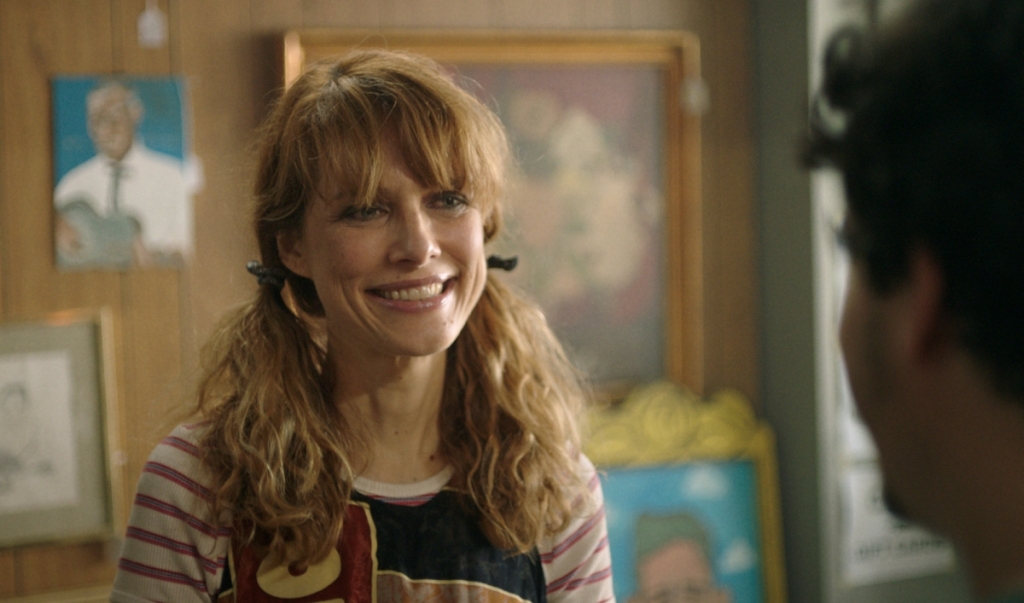On May 16th of this year, beloved filmmaker and television director Lynn Shelton tragically passed away from a previously undetected blood disorder. Today, August 27th, would’ve been her 55th birthday and to pay tribute to her, we want to celebrate her immense talent for crafting realistic characters while finding everyday intimacy and beauty within the smallest of things.
Born in Oberlin, Ohio, and raised in Seattle, Washington, Shelton studied photography before taking her first steps into the film industry as an editor in the early 2000s, while also making a series of experimental short films. One of them, titled The Clouds That Touch Us Out of Clear Skies (2000), is a mixture of personal retellings and abstract visuals that together create an intimate exploration of the emotions women have to navigate through – including depression, guilt, grief and surrender – in regards to miscarriage. Shelton, whose voice is easily recognised, shares her own experiences in great detail. While this is rooted in real experiences as told directly by the women who experienced them, you can already sense the intimacy Shelton would later bring to her fictional films.

While she wanted to be a director, she was worried that being in her late 30s, it was too late for her to begin. However, when she saw Claire Denis speak at Seattle’s Northwest Film Forum in 2003 she was encouraged to try since Denis revealed that she was 40 years old when she directed her first feature film. Shelton’s feature film debut as a director came in 2006 with We Go Way Back, a story about a 23-year-old actress who is forced to examine her life by her thirteen-year-old self. However, it was Humpday (2009) – with the premise of two straight men deciding to make an amateur pornographic film together – that cemented Shelton’s place in the film industry as a name to reckon with.
As a pioneer of independent filmmaking, Shelton was frequently associated with the subgenre mumblecore, which is characterized by an emphasis on dialogue over plot and naturalistic acting. The potential with mumblecore is enthralling since – when it’s successful – it can feel as if you’re watching something more authentic unravelling in front of you. Dialogues might feel relatable while situations that arise might feel like they do so effortlessly. Relationships can quickly change within seconds if a badly chosen word is yelled at the heat of the moment, while quieter moments reveal things of importance about our characters. Before the big day in Humpday, Ben (Mark Duplass) tells Andrew (Joshua Leonard) about once having an attraction to a male video-store clerk as a kid, which acts as an intimate heart-to-heart between the two old friends.
Within the intimate relationships Shelton portrays, suppressed emotions are frequently explored within her characters. While some things are revealed in speech, many are conveyed through body language and facial expressions to fill in the gaps of what our characters can’t seem to vocalize just yet. In Your Sister’s Sister (2011) all three main characters have suppressed feelings that aren’t shared openly until there’s a breaking point. Starring an unconventional love triangle featuring Hannah (Rosemarie DeWitt), her half-sister Iris (Emily Blunt) and Iris’s best friend Jack (Mark Duplass), the film begins with Jack who is caught in a self-destructive spiral after his brother’s death. After accepting Iris’ proposal to use her father’s cabin to recuperate, Jack arrives only to find Hannah, who had just broken up with her girlfriend. During their first night, as neither of them can fall asleep, they end up getting drunk and eventually have sex. When Iris unexpectedly arrives the next morning, each characters’ secret longings – Hannah for motherhood and Jack and Iris for each other – get closer and closer to their breaking point.

Your Sister’s Sister is an intimate film in the fact that it’s mostly taking place within the secluded cabin and throughout it all, we barely meet any other characters. However, it’s mostly in how these characters interact with each other that create a sense of everyday intimacy that feels realistic. For instance, when Iris first admits to Hannah that she likes Jack, she does it while they’re in bed together. The intimacy of this reveal is further heightened since they are close as they whisper, almost as if they’re trying to not say anything too loud as to scare it away. Furthermore, when Hannah and Jack sleep with each other, their sexual encounter feels less sexual and instead rather unspectacular compared to other examples in film. As Hannah leaves to grab a condom, Jack tries to find a pose in bed that’s both sexy and relaxed but only comes across as ridiculous. The whole scene mostly comes across as quite awkward and, for Hannah, forgettable. The sex scene isn’t long, as the sexual act in itself isn’t either, and when Jack squeals – to his confusion – when reaching climax it just feels refreshingly unpolished.
Another great detail found within the human struggles Shelton portrays is where a character feels conflicted about their desires as they’re torn between what’s right and wrong. An example of these inner struggles can be found within Carol (Edie Falco) in Outside In (2017). In Outside In, we meet 38-year-old Chris (Jay Duplass), who is released from prison after serving 20 years for a murder he didn’t commit. Back in a town he doesn’t recognise, Chris craves simplicity but his only sense of stability is Carol, his former teacher and the one who helped him get released. Their relationship, which developed to something deeper when Chris was in prison, changes with Chris on parole. While Chris is somewhat dependent on Carol, Carol is conflicted in trying to navigate between her feelings for Chris and the responsibility she has towards her family. When Carol first realizes the romantic aspects of Chris’ feelings, she confides in a male co-worker. While Carol tries to underplay everything as a crush, she feels obvious pleasure about Chris’ attention but it’s not without also feeling confusion and guilt because she’s married. Therefore, she’s trapped in her own kind of prison.
In The Guardian article “Why I like leading ladies who don’t act ladylike”, Shelton comments on how men have long dominated the quarter-life crisis movie. While these films portray conflicts and emotions common to everyone, she underlines that only men have been permitted to experience them in public since women had to be mature. “Women on screen were idealised into inhumanity because cinema was too scared – and too preoccupied with the guys – to show them as real people”, writes Shelton. This article was written in connection to the release of Laggies (2014), a film that stands out in Shelton’s filmography since it has a considerably bigger budget along with being the only film she had not also written.

Laggies (also known as Say When in the UK), written by Andrea Seigel, follows the overeducated and underemployed 28-year-old Megan (Keira Knightley) who is caught in a quarter-life crisis. Megan is someone who quietly accepts other people’s decisions for her until it, naturally, reaches a breaking point. One night she runs into a group of teenagers, one of them Annika (Chloë Grace Moretz), and she sees an opportunity to get a break from her real life to figure things out. However, moving in with Annika and her father Craig (Sam Rockwell) for a week is not just a break but also a wake-up call.
While trying to figure out what she wants in life, Megan lies, cheats and acts in ways that wouldn’t traditionally be labelled as “ladylike”. For instance, instead of going to the career counselling session her boyfriend and mother want her to go to, she hides until it’s safe to return home and lies about her actual whereabouts. Just as Shelton writes in her article, there’s a need for characters like Megan to exist – especially where we’re allowed to root for them instead of being forced to vilify them.
The characters found within Shelton’s filmography might not always be doing the right things, but they’re often trying their best. As we’re given the chance to relate to these characters, it creates some sense of relief amidst the chaos that is everyday life. Maybe you relate to these characters because you’re questioning what you’re doing in life or maybe it’s because you feel pressure about who you should be or what you should be doing. “You can’t keep putting aside what you want for some imaginary future. You’ve just got to suck it up and go with your gut”, says Megan to Annika. Within the film’s universe, it’s a tender moment where Megan speaks candidly about her lessons in life. Outside of the film’s universe, it speaks in alignment to Shelton’s career of going her own way and not waiting around for permission that might not come.
The final feature film in Shelton’s directing career is Sword of Trust (2019). In the film, we meet Cynthia (Jillian Bell) who inherits a sword from her deceased grandfather, which is believed by him to prove that the South won the Civil War. Together with her girlfriend Mary (Michaela Watkins), they partner up with a pawnshop owner and his assistant (Marc Maron and Jon Bass respectively) to arrange for the sword to be sold. While the plot focuses on the sword, it mostly acts as a device to bring our characters closer and open up to each other.

In Sword of Trust, Shelton plays Deirdre and despite only having one big scene, it leaves a huge mark. When she first appears in the beginning at the pawnshop, she’s lightening up everything with her infectious smile. However, the atmosphere quickly changes to nervous silences and glances underneath her thick bangs when Mel (Maron) enters the room. The tension underlines apparent history between the two, and while it’s tough to watch, the scene is also a testament to Shelton’s talent as an actress as despite the limited screen time, she manages to leave a memorable performance. Sword of Trust, with an ending that cuts even deeper in light of Shelton’s passing, is a conclusion to a feature film career filled with love for people and the stories they create and share throughout life.
As women struggle to make a place for themselves in the film industry, Shelton managed to stay true to herself with everything she did. With eight feature films and more than 40 television directing credits – including Mad Men, Glow, Love and Fresh Off the Boat – to her name, Shelton left us with unforgettable work that forever will be devoured and discovered by people for years to come. One of her final credits, directing four episodes of Little Fires Everywhere, posthumously resulted in her first Emmy nomination in the best directing for a limited series, movie or special category.
Shelton continuously created a sense of belonging in her film making, a place for characters to be multifaceted and messy in the most human ways possible (and therefore she simultaneously gave space for her viewers to feel acknowledged). A collaborator at heart, her films are somewhat modest on the surface but simultaneously loud and throughout every film, her love and understanding for people seeped through the screen. In a world that’s so caught up in finding and keeping up the strict divide between good and bad, Shelton tried to look for and explore the humanity found within every character. While she clearly left an undeniably big void when she left the world far too soon, through her work she’ll live on forever.


Leave a comment